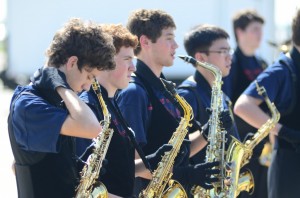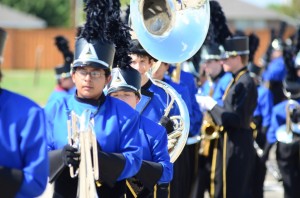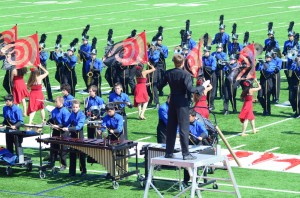Two weeks of band camp in the summer. Five 7 a.m. rehearsals each week. Private lessons. Pass-offs. After-school sectionals. The Jesuit Ursuline Ranger Band (JURB) has been busy preparing for their two October marching contests at Little Elm Athletic Complex and Legacy Christian Academy.
The Little Elm Classic on the Lake took place on Oct. 12. Jesuit has participated for several years in this contest, which provides good practice for this year’s major event, the Texas Private School Music Educator’s Association competition. The JURB is the only non-public school band in the Little Elm Classic, an impressive feat.

Bands compete on four levels at the Little Elm: A, AA, AAA, and AAAA. Division A is for bands such as JURB with 50 winds or less; AA is for bands with 51-72 winds; AAA is the division for bands containing 73-100 winds; finally, division AAAA includes bands with 101 or more wind players.
Freshman trumpet player Martin Flores ’17, participating in the first ever marching contest of his JURB career, commented that at “Little Elm, [he] could tell that the band had an understanding of what they had to do. [The band] knew [they] were in a very tough division and [he] could tell that all the freshman just wanted to have at it because most had nothing to lose, being in their first tournament.” He concluded saying that the band “gave it their all that day,” leaving everything out on the field.
Director Zane Crownover, who directs the majority of the marching rehearsals, said that the performance was the “best he had seen” of the band up to that point in the season.
The Jesuit Ursuline Ranger Band performed first, setting the standard for all who would come after. Following their performance, band members changed out of their uniforms into their theme shirts and sat in the stands to observe the other bands at the competition.
Dustin Bagayna ’15 enjoyed watching the larger public school bands perform, because “even though we don’t place high typically, Little Elm is still a positive. We learn more. We learn new tricks. We learn visuals and new techniques. We use this to improve our marching at the TPSMEA contest.”
One feature of the contest that most band members like about Little Elm is the shout out system. Band members of all different bands can submit shout-outs to be read out on the loudspeaker by the announcer. JURB members take pride in creating the funniest shout-outs. This year, a Jesuit student even asked an Ursuline student to this year’s homecoming over the intercom (she said yes).

The Little Elm Contest had two music judges, two marching judges, one general effect judge, one percussion judge, and one auxiliary judge. The ten top scoring bands, regardless of class, are asked to perform again in the finals. There were also a variety of awards including Best In Class, 2nd & 3rd Place Trophies by Classification, Caption Trophies in Prelims and Finals Grand Champion Individual Medals.
Jesuit did not place high enough to make the finals or to be invited to perform in exhibition, nor did it win any awards. Band members did not expect otherwise, and regarded their participation as a means to reveal flaws in the show and fix them before the private school contest.
Director Donovan Putnam explained that “with the private school contest being at the end of our season, it’s a really long time to work with nothing in front of you. It was a good way to break up the season. Only doing one competition is kinda tough because it doesn’t give you an opportunity to reflect and improve. Before, we would do one competition and the season would be over, and we talked about the judges’ comments, but it was like we weren’t fixing it for anything. Now we can listen to the judges’ comments and fix some things and still have something to work for.”
Color Guard member Zoë Nash ’14 mentioned that “it’s always fun to just spend time together as a band and watch all the other schools perform. All in all, I think that [the Little Elm Classic] was definitely worth it. It provided us with a lot of motivation to get serious about the private school contest and the critiques were unbelievably helpful.”
The weather provided a surprising twist in this year’s competition. During the afternoon, the sky darkened and lightning was seen in the distance. It started pouring rain in the beginning of one of the public school band’s performances. All those watching in the stands rushed to the exits. Jesuit-Ursuline students charged through the rain to board their buses for protection from the elements. Unfortunately, on the ride back to Jesuit, a leak in the roof was discovered in the freshmen-sophomore bus with water dripping into the bus.

JURB was using the old yellow school buses owned by Jesuit, because all charter buses in the Metroplex were leased for the Texas-Oklahoma football game. Both the underclassmen bus and the upperclassmen bus had to stop at a gas station for a quick pit stop to fix up the leaks. Finally, the band arrived back at Jesuit, drenched yet proud.
During the following week, students listened to the judges’ comments and discussed them as a group. Rehearsals began to mend holes in the show and add visuals to enhance the performance as much as possible for the TPSMEA contest on Oct. 26.
The two weeks after the Little Elm marching competition were crucial. Each day, the band took the show apart and pieced it back together to improve as much as possible. The dawn of each new school day brought another rigorous rehearsal. Movements were repeated until they were spotless and a new visual was introduced. Band members considered it the two most demanding weeks of the marching season. The well-oiled machine emerged on October 26, ready to hit the field of competition.
The big day started at 10:45 and was non-stop practice and competition for 6 1/2 hours. Before leaving, the band ran through the program several times before suiting up and boarding the buses that would lead them to Legacy Christian Academy in Frisco. Once there, the ensemble sang and played the music one last time before the performance that would decide the fate of the band.
The organization of the TPSMEA Marching Competition differed slightly from the Little Elm Competition. In Frisco, bands competed in only two categories, A and AA. The A groups have less than 40 members and AA have over 40 students. The Jesuit Ursuline Ranger Band was only one of two bands in the AA division with four bands in the A division.
Rankings of 1 to 5 were also given out for the competing bands from three different judges based on their performance, 1 meaning superior, 2 meaning excellent, 3 meaning good, 4 meaning fair, and 5 meaning weak. Bands always strive to achieve sweepstakes, or all 1’s in competition, which has only happened once before in the JURB’s history. Bands also garner official ranking by earning the most points out of 1,000 from the five different adjudicators and the caption awards for best drum major(s), winds, color guard, drumline, marching, and overall effect. Jesuit received an overall superior rating, earning straight ones in the competition.
After three months of preparation, it all came down to the show performed in Frisco on the chilly October day. The band took to the field, second-to-last, and performed an amazing rendition of their “Shades of Latin” show. Mr. Putnam said that the band had “scored better than ever before,” and he felt that their performance was “the best ever.” Band members were ecstatic after the performance, knowing that they had all played a part in their best performance all year. With the whole band, including the directors, extremely happy with the performance, the optimism was palpable as the ensemble marched onto the field for the awards ceremony.
First, the winners from division A were read, all the while tension built in the ranks of the JURB. When it came time for the results in class AA, Nolan Catholic of Fort Worth ended up taking all of the awards for the year, and the tinge of disappointment was felt by all hoping for a triumphant end to such a successful year.
Even though the band did not win the competition, Mr. Putnam remains “excited for the future,” knowing that the band can only improve from here on. The foundation left by the leadership this year can only lead to great things in the upcoming years for JURB. Martin explains how the upperclassmen have “[passed] the baton to the next generation to keep the fire inside all of us going,” displaying the vision that everyone who will be the future of the band shares. As a whole, this year’s run of competitions went along with great success, with the best private school performance the band has ever had, and the band’s future looks bright and full of possibilities.
